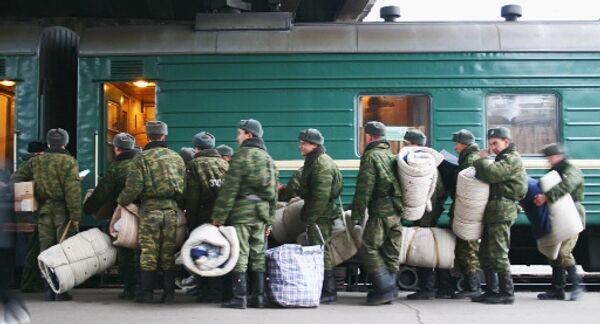MOSCOW. (RIA Novosti commentator Dmitry Babich) - The 2010 conscripts have a chance to enroll in a college without doing military service first.
Viktor Ozerov, head of the Defense and Security Committee at the Federation Council, announced that according to new legislation, the spring draft will end on July 1, as opposed to July 15, as last year.
What does that mean? According to the law, students are exempt from military service. Therefore, the most "dangerous" period for potential conscripts is the time when they have already graduated from school but have not yet enrolled in college. Most of the time, this period falls on the month of July, when the school graduation ceremonies are over and the university enrollment process is in full swing. Now the Defense Ministry extended the draft period until July 15, to bring in as many conscripts as possible.
According to Ozerov, in 2010 the conscripts will be able to avoid this "trap," as the two new federal laws that are being currently developed, the Law On Military Duty and the Law On Military Service, will replace the existing unified law On Military Duty and Military Service.
The idea to replace the existing law has a clear rationale - to separate the professional soldiers, who join the military voluntarily, from the conscripts, who are drafted for compulsory military service.
Based on the published drafts, the new legislation clearly elaborates the contracting rules and the rights and obligations of those serving under a contract. If successful, the legislation will finally allow the army to fill its ranks with servicemen who choose to be in the military. The issue, however, is whether the MPs will be able to adopt the new laws prior to the 2010 spring draft.
The autumn conscription, currently under way, is proceeding under the most severe rules which were approved in 2008. This affects not only vocational schools and colleges, which are left with almost no male students, but also some universities.
Military officials deny the conscripts the right to receive a second degree without fulfilling their military duty first. According to them, if a conscript had been granted a college or university deferral in 2005, for example, he cannot obtain a new deferral in 2009 or 2010. The military refer to amendments to the legislation introduced in 2008, despite the fact that a law cannot be applied retroactively.
The military have their own rationale: they are increasingly facing the demographic problem, which has its roots in the early 1990s, when the birth rate plummeted. On top of that, the term of the military service has been reduced to one year, which makes it necessary to cut the deferrals, especially for students. The army needs educated soldiers who will be able to handle modern military equipment, which requires a certain level of education. Human rights advocates, however, are concerned about the sweeping nature of the 2009 draft. They question the military's claim that they have no other reserves available to them.
"The Defense Ministry has a reserve of conscripts from previous years. These include individuals under the age of 27 who have not been drafted previously for various reasons. In addition, the army is undergoing a comprehensive reform with tens of thousands of officers being laid off," says Sergei Krivenko, the coordinator of the Citizen and the Army coalition of public organizations.
"The army is currently at a crossroads of sorts. It will either go through with the reform, bringing it to the level of privates and contracted servicemen, or the old system will be preserved, but with a significant reduction in officer corps. If the latter option prevails, this will have the most negative consequences. The officers, overwhelmed with the constant threat of being laid off, will not be able to properly handle affairs in their units," he says.
But there is a problem, which is not limited exclusively to Russia: 18-year-old men should not be left to their own devices. This results in a severe youth hierarchy, which is often enforced through violence. The reduction of the service term, unanimously approved by human rights advocates and experts alike, failed to become a panacea, including for the notorious hazing problem.
There is no such notion as hazing in the legislation; the terms it uses are "torture" and "abuse"; just as there is no such notion as "administrative resource," but "violation of voters' rights." What is essential is that individuals should be able to uphold their rights.
"Certainly, the reduction of the service term is a significant achievement," Sergei Krivenko says. "The root cause of hazing, however, does not lie in the two-year service term, but in the closed nature of military units and in the fact that servicemen are deprived of their rights, as well as in the inability to assert the rights that they have but are not aware of. As long as these problems are not resolved, the role of the 'older' servicemen will be taken on by the contract-based soldiers, for example, in the mixed conscription units."
Military justice officials insist that they have learned from their past mistakes, and that the rights of servicemen are protected. In response to my question at a press-conference in Komsomolskaya Pravda, Alexander Nikitin, a department head at the Main Military Prosecutor's Office, overseeing law enforcement in military units, said that conscripts would be given special memos listing their rights as well as telephone numbers of the closest military prosecutor's offices.
According to Nikitin, last year hundreds of criminal cases were opened for the violations of servicemen's rights. There have been cases when military prosecutors literally rescued desperate soldiers, and such cases have become more frequent recently.
Still, the main safeguard against violence is not the military prosecutors but civil monitoring of compliance with the law and the presence of people who are not indifferent to the problems of conscripts.
The opinions expressed in this article are the author's and do not necessarily represent those of RIA Novosti.

